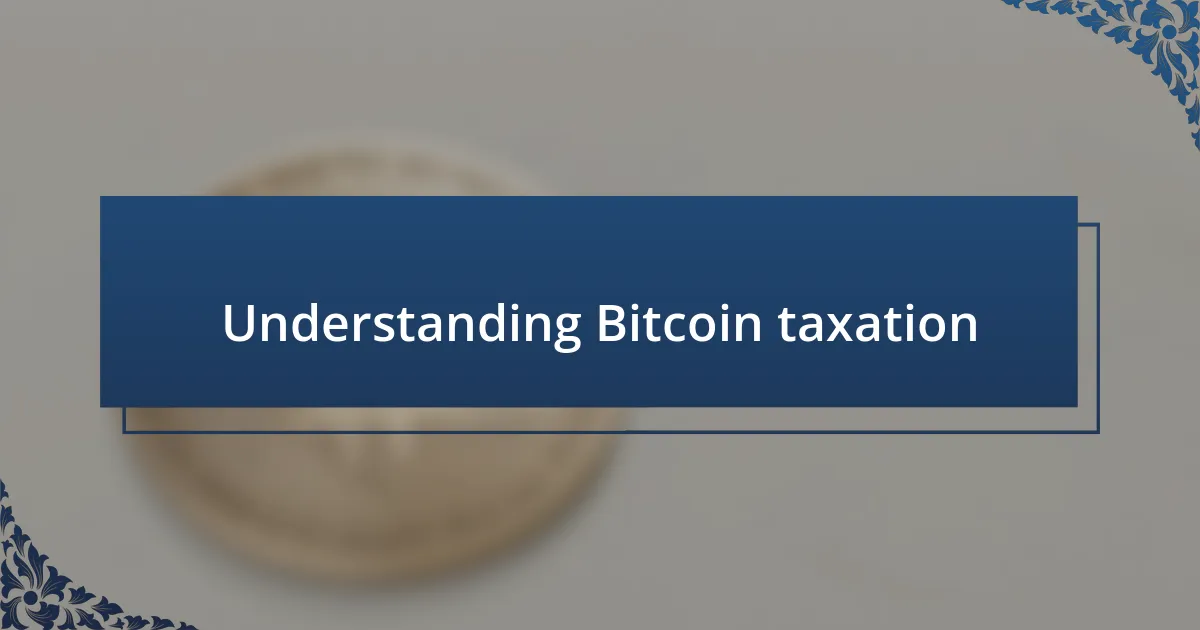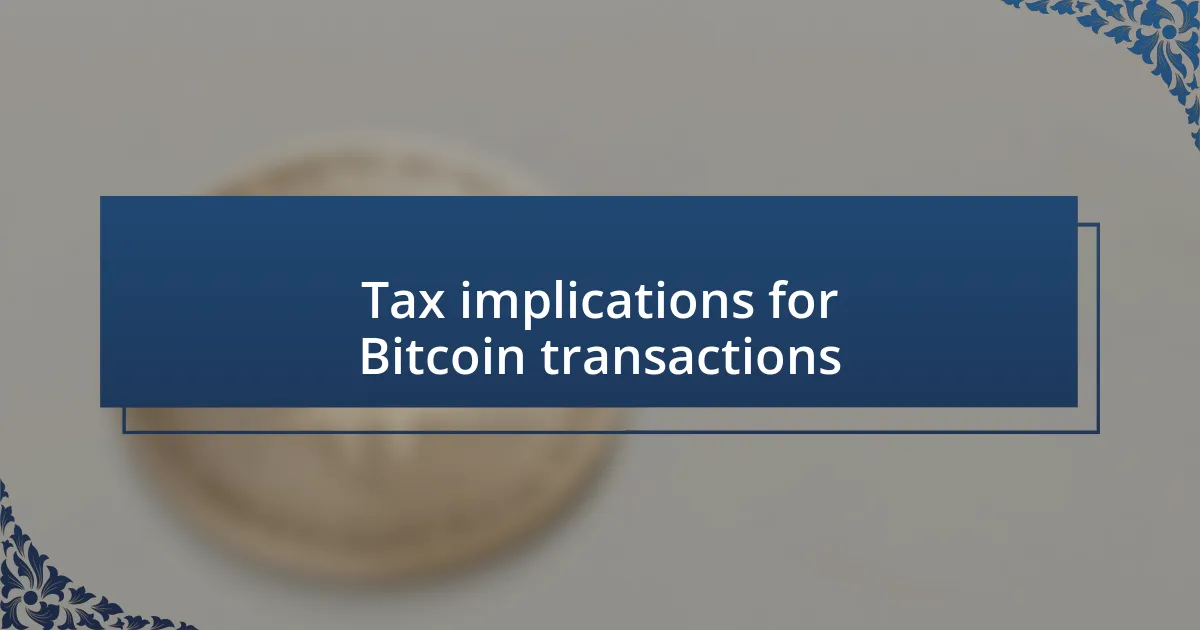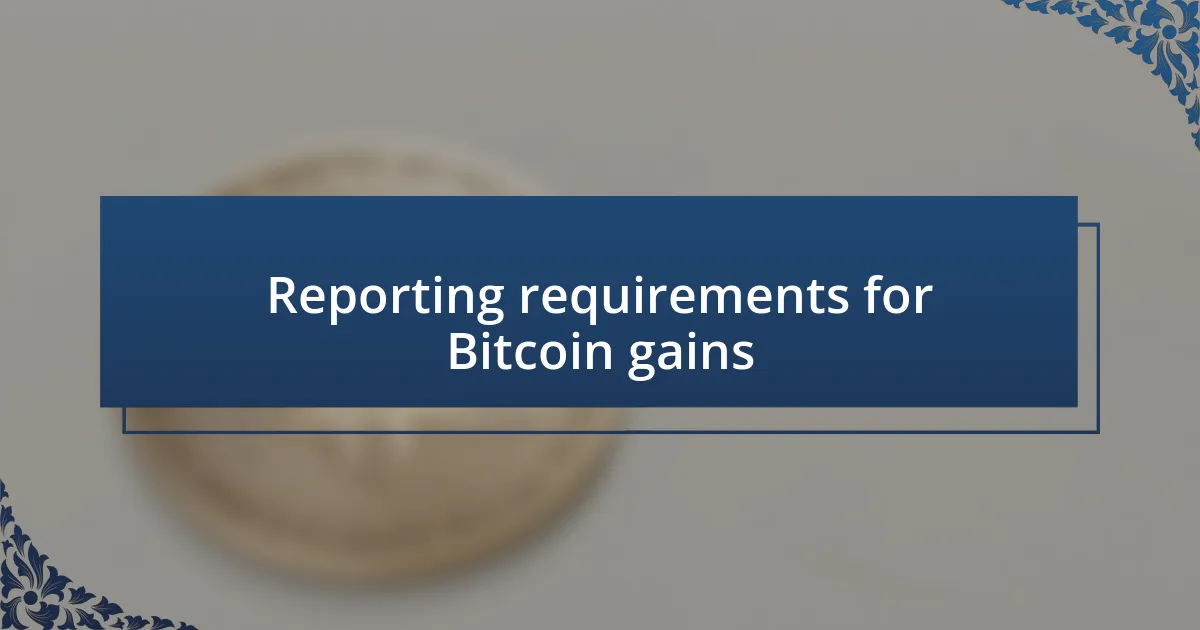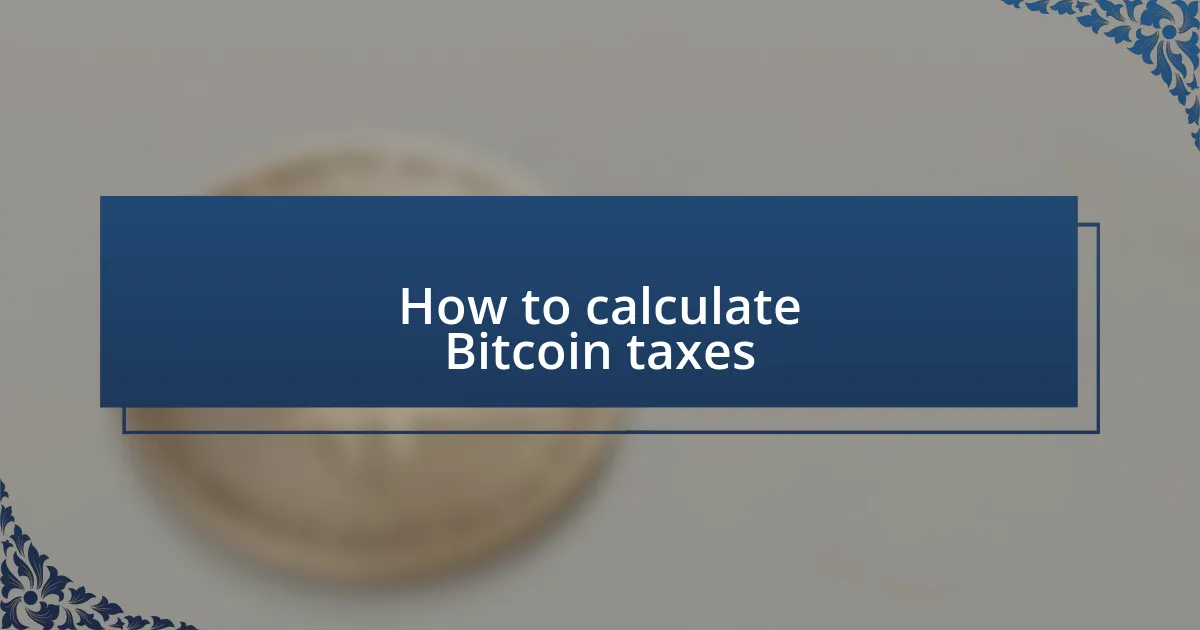Key takeaways:
- Understanding Bitcoin taxation requires meticulous record-keeping for all transactions to avoid unexpected tax liabilities.
- Different capital gains tax rates apply for short-term vs. long-term holdings, influencing investment strategies.
- Utilizing tax software or consulting professionals can simplify the tax calculation process and improve reporting accuracy.
- Reliable resources, such as the IRS website and online communities, provide valuable guidance in navigating Bitcoin taxation.

Understanding Bitcoin taxation
Bitcoin taxation can feel overwhelming, especially since the rules vary significantly by jurisdiction. I remember the first time I realized that the gains from buying and selling Bitcoin weren’t just abstract numbers in my wallet but potential tax liabilities. It made me wonder, how many others are stumbling through these complexities without guidance?
When I delved deeper, it struck me how crucial it is to track every transaction meticulously. Each time I exchanged Bitcoin for goods or services or converted it back to fiat, I had to consider the reported gains or losses. The emotional weight of not having accurate records can be quite stressful—after all, who really wants to deal with a surprise tax bill?
One aspect that really resonated with me was the distinction between short-term and long-term capital gains. Understanding this made me rethink my trading strategy. It raised a question in my mind: wouldn’t it be smarter to hold onto Bitcoin longer to benefit from lower tax rates? This realization transformed my approach to investing in cryptocurrency.

Tax implications for Bitcoin transactions
Whenever I think about the tax implications for Bitcoin transactions, what stands out is how easily someone can overlook specific details. For instance, I once sold a fraction of my Bitcoin to pay for a special dinner. I was excited at the time but later realized that I had to report that transaction on my taxes, documenting every penny gained. It made me keenly aware that enjoying the fruits of my investment came with a responsibility I hadn’t anticipated.
The stakes can be high, especially when considering the difference between capital gains tax rates based on how long you’ve held your Bitcoin. Short-term trades can come with hefty taxes, sometimes as high as your regular income tax rate. Believe me, experiencing that sudden hike in my tax liability after a quick profit made me pause and reconsider how I approach my investments. The long-term strategy not only benefits in terms of taxes but also aligns with the philosophy of supporting Bitcoin’s potential growth over time.
Navigating the tax landscape for Bitcoin is not just about understanding rates; it’s about being prepared for every transaction’s documentation and implications. A personal experience comes to mind when I overlooked keeping detailed records for a series of smaller transactions. The headache of reconstructing those trades for my tax filing was not only time-consuming but also nerve-wracking, knowing I could mistakenly report a loss when it was, in fact, a gain. Being detail-oriented in this field isn’t just a preference; it’s essential.
| Transaction Type | Tax Implication |
|---|---|
| Buying Bitcoin | No immediate tax impact |
| Selling Bitcoin for profit | Capital gains tax applied |
| Using Bitcoin to purchase goods/services | Capital gains tax on increases in value |
| Hodling Bitcoin | No tax until sold or used |

Reporting requirements for Bitcoin gains
When it comes to reporting requirements for Bitcoin gains, I learned that meticulous record-keeping is more crucial than I initially thought. In my early days of trading, I didn’t realize how each transaction needed detailed documentation. I remember feeling overwhelmed when tax season approached, scrambling to gather all my transactions, only to discover that some essential information was missing. It felt like unearthing fossils while digging through my notes.
In the world of Bitcoin, clarity in reporting can make a significant difference. Here are key points to keep in mind:
- Track All Transactions: Document every trade and use a spreadsheet to create a running total of gains and losses. I found that keeping this updated throughout the year saved me a lot of stress.
- Document Dates and Values: Note the purchase and sale prices along with the dates. I once learned the hard way that a single missed detail can lead to complications.
- Calculate Gains: Understand how to calculate gains based on the purchase price versus the selling price. Any profit you realize is subject to capital gains tax, which I realized can significantly affect your overall tax liability.
- Use Tax Software or Professionals: Depending on the volume of transactions, consider using tax software or hiring a tax professional. I wish I had chosen this route sooner, as it would have provided peace of mind and accuracy in reporting.
Being proactive and organized in my approach to reporting has been an evolving journey, but one that has made me more confident in my financial decisions.

How to calculate Bitcoin taxes
Calculating Bitcoin taxes can feel overwhelming, but I learned that breaking it down into manageable steps helps. For instance, I began by meticulously logging every transaction, noting the purchase price and date, which made it easier to determine capital gains later on. This approach transformed what seemed like a massive chore into a straightforward process, allowing me to see the bigger picture of my investments.
Have you ever wondered how capital gains are calculated? From my experience, it’s vital to understand that the gain is the difference between what you paid for Bitcoin (its basis) and what you sold it for. I remember the moment I realized that even minor fluctuations could lead to hefty tax implications. It hit me that keeping accurate records would not only ease the filing process but potentially save me money in the long run.
Lastly, I can’t emphasize enough the importance of utilizing tax software or consulting a professional. When I finally decided to give this a shot, it felt like a weight was lifted off my shoulders. The software guided me through the intricacies of tax calculations, which made filing so much clearer and less stressful than I ever anticipated. Have you considered how much easier it could be with the right tools on your side?

Resources for Bitcoin tax guidance
Identifying reliable resources for Bitcoin tax guidance has been crucial in my journey. One resource I found particularly useful is the IRS website, which outlines the basics of cryptocurrency taxation clearly. I remember spending hours digging through materials, and finding a well-organized source made all the difference in my understanding.
In addition to official sources, seeking out online communities—like Reddit’s subreddit dedicated to cryptocurrency—helped me connect with others facing similar challenges. Sharing personal experiences and asking questions in these forums offered practical advice that I couldn’t find in textbooks. Have you ever leaned on a community for guidance? There’s something refreshing about learning from the collective experience of others.
Lastly, I recommend exploring specialized tax software designed for cryptocurrency transactions. When I tried one, it provided step-by-step assistance, making me feel like I was in control of my financial situation. This tool not only eased the burden but also gave me a sense of confidence about filing my taxes accurately. Isn’t it reassuring to know that tools exist to simplify something that can feel so daunting?






